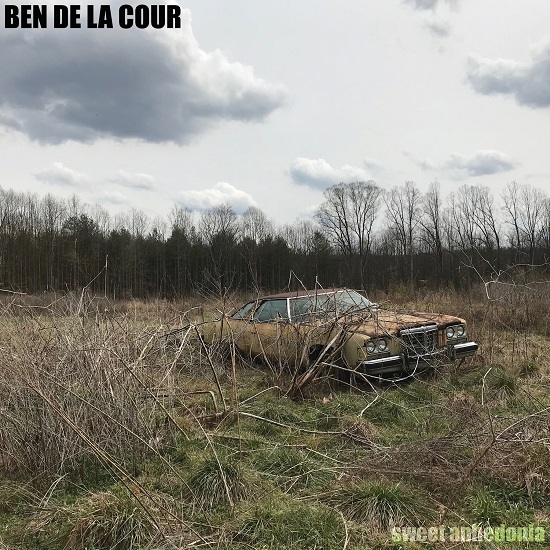
Usually the most difficult thing about reviewing music is working out where to start. Ben de la Cour solves that problem by giving the title song of his new album an enigmatic and intriguing title of ‘Sweet Anhedonia’. I had to look it up, and, logically enough, it comes from the same Ancient Greek root as hedonism and it means the inability to feel pleasure; it’s usually associated with illnesses such as depression. Maybe it’s just a coincidence, but there may be a reference to the 1996 Catatonia single, ‘Sweet Catatonia’. The title song, ‘Sweet Anhedonia’, is a melancholy exploration of this condition with a haunting triple time arrangement enhanced by delicate backing vocals and pedal steel.
There’s a lot more to Ben de la Cour than melancholy. There’s some wordplay in the song titles ‘Appalachian Book of the Dead’ and ‘Suicide of Town’, there are a couple of co-writes with very interesting songwriters, some great stories and some interesting arrangements. One of the co-writes, ‘Numbers Game’, was written with the gifted Canadian singer-songwriter Lynne Hanson and deals with the loading of life’s dice in favour of the privileged, set against a backdrop of finger-picked acoustic guitars, fiddle, pedal steel and Laurel Canyon harmonies.
Don’t run away with the idea that ‘Sweet Anhedonia’ is just a bunch of sad songs. The riff-driven ‘Suicide of Town’ is pure FM drivetime with a vocal that hints at Tom Petty and Rob Thomas and guitars playing off against each other, while ‘Shine on the Highway’ combines two electric guitars with fiddle and trumpet to create a song that would feel at home on a Greg Dulli solo album. And talking of influences, ‘American Mind’ hints at Jackson Browne’s apocalyptic feel from ‘Before the Deluge’, with the addition of Vietnam references and martial drumbeat (which is also a common theme throughout the album) for emphasis.
‘Palookaville’ features a series of characters that would fit in perfectly on any of the first three Springsteen album and uses Buddy Holly as an example of an artist whose legacy is untainted because he wasn’t around long enough to go downhill and either hit the skids or end up playing residencies in Vegas.
‘Sweet Anhedonia’ is a lyrically thought-provoking set of songs set against diverse musical backgrounds and textures, incorporating influences from Americana, folk, rock, pop and a whole lot more, skilfully blended to create a work that is entirely Ben de la Cour.
‘Sweet Anhedonia’ is released in the UK on Jullian Records (JR32CD/LP) on Friday October 13th.
Here’s the video for ‘Shine on the Highway’:
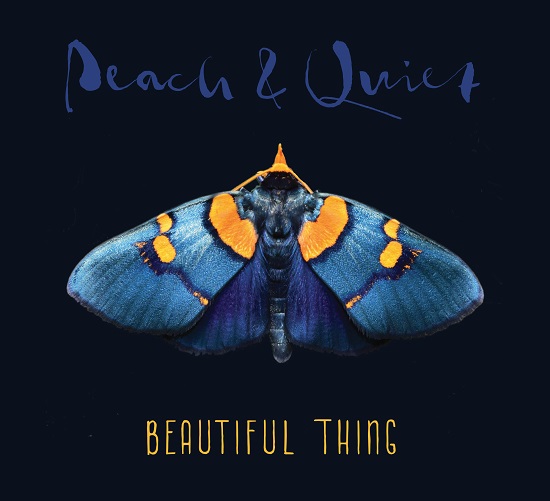
Two years after their debut ‘Just Beyond the Shine’, Peach & Quiet are back with another bunch of great songs aided and abetted by producer and guitarist extraordinaire Steve Dawson. The album continues where the debut left off with some gorgeous Americana/country rock/blues stylings with a few influences creeping in from the background of the duo Jonny Miller and Heather Reed. Our review of their debut referenced the usual Laurel Canyon influences but ‘Beautiful Thing’ pulls in some slightly rockier influences like seventies Fleetwood Mac (or particularly Lindsey Buckingham and Stevie Nicks) and a lot of that’s down to Steve Dawson’s production and playing with layers of guitars from resonators through electrics to pedal steel.
The gentle title track sets the tone for the album; its country feel with those guitar layers, lovely harmonies and Jonny Miller’s slightly raspy vocal are things that you hear in varying degrees throughout the album. As an added bonus (for me, anyway), the song opens with one of my favourite chord progressions, falling from the tonic to the subdominant. Want to know why I like this progression? It features in two of my favourite songs, ‘These Days’ by Jackson Browne and Graham Parker’s ’Watch the Moon Come Down’. And honestly, speaking as a mediocre guitarist, it’s easy to play and sounds good.
With a title ‘Horse and Saddle’ you’d be expecting a country arrangement; that would be too predictable. Jonny’s dad is a reggae DJ and he was brought up around reggae musicians, so the influence was always going to come out somewhere. Heather’s dad was a Hammond player and Hammond’s very much in evidence on the slow blues of ‘This Time’, the rock vibe of ‘Behind the Sun’ with a nod in the direction of Crazy Horse and ‘Pockets Empty’, the story of a relationship with a charismatic psychopath.
At a time when temperatures are heading below zero again, ‘Beautiful Thing’ brings a welcome splash of California sunshine with its infectious melodies, exquisite harmonies and perfect arrangements, balancing multiple guitar parts with piano and Hammond to create perfect settings for Jonny and Heather’s solo and duet vocals. Summer feels a long way away at the moment, but this album brings it a bit closer.
‘Beautiful Thing’ is released on Peach & Quiet Music (P&QCD002) on 20th January 2023.
Here’s a live video of ‘This Time’:
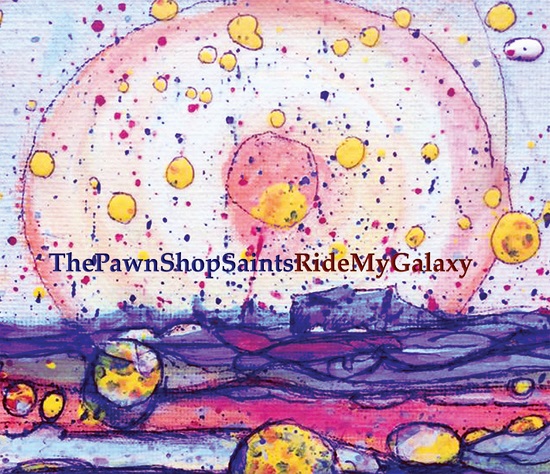
‘Ride My Galaxy’ looks like it will be one of three Pawn Shop Saints/Jeb Barry albums conceived in the pandemic to be released in the near future. The thing that unifies this album and will probably unify the remaining two albums is Jeb Barry’s voice. The songs range from the nostalgic West Coast country/rock of ‘Chevy Nova’ to the unrelenting gloom of ‘Ain’t No Mama Here’, but the cracked emotion of the voice that combines the vulnerability of Jackson Browne with the raw power of Greg Dulli is a constant.
There are the trademark Pawn Shop Saints acoustic staples aplenty on the album, but there are also a few elements of pop and rock pushing through the mix. There’s an opening studio chat on ‘Exits’ about getting the song down “mistakes and all” that sets the tone for the album. It’s much more about capturing the feel of the songs, rather than perfect performances. There’s no shortage of nods in the direction of iconic pop and rock figures and songs either. The I-VI chords at the start of ‘diane’ have a hint of Sam Cooke’s ‘Cupid’, while ‘Jenny Why’ has a hint of Danny Whitten’s ‘I Don’t Want to Talk About It’ and an arrangement that’s reminiscent of The Band. The paranoid menace of ‘Wicked’ is emphasised by a band sound that could be Crazy Horse at its most rough and ready. You get the picture; you can pick out the influences, while it’s all held together by great songwriting and Jeb Barry’s voice.
The album opens with a song that isn’t in typical Pawn Shop Saints territory; ‘Chevy Nova’ is unashamed seventies nostalgia. It’s a cars, girls, booze and drugs song, but in an innocent and naïve way. The closing song is firmly back in Pawn Shop Saints lyrical territory with a story of the pain caused by a broken relationship, but with a grungier sound that’s emphasised by a completely live studio recording.
‘Ride My Galaxy’ is an intriguing blend of the hard-edged dirt-poor Americana typified by the floods, crop failures and fever deaths of ’Ain’t No Mama Here’ and some new elements pop, punk, psychedelia and even nostalgia. It’s a good mix and creates a fascinating album.
‘Ride My Galaxy’ is out now Dollyrocker Records (DR20221). Here’s the video for ‘Exits’:
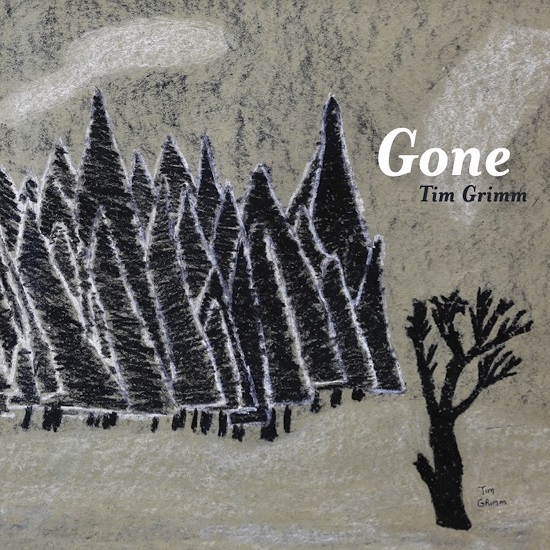
Tim Grimm released the single “Gone” at about the time of the American election last year as the third of a trilogy of singles about the Trump era. It could have been a very angry song, but Tim pitched it as a regretful look at the hypocrisy and viciousness given free rein by the contentious president number forty-five. Now it’s one of the pillars of an album that’s suffused with loss and leavened by a sense of rebirth and renewal.
The one exception to this mood is the (presumably) autobiographical “Cadillac Hearse” which rattles along in the style of vintage Johnny Cash with acoustic guitar and mandolin fills and walking bass and tells an uplifting coming of age story set in rural community in America in the sixties where the hearse doubles up as an ambulance. It’s the bit of rollicking fun that throws the rest of the album into a stark contrast.
The album opens and closes with a full arrangement and a stripped-back version of the song “A Dream”, which establishes and then reinforces the theme of the album. “A Dream” is a poignant, elegiac story of loss, linked to the song “Laurel Pearl” by the lyrical reference to ‘the girl with the funny name’. “Laurel Pearl” moves on from a dream evocation of loss to a genuine story of a life ended too soon. This isn’t the only link between songs on the album; “Joseph Cross”, the story of the death of a Native American man with an incredible history, was written by Eric Taylor, one of the three songwriters mentioned in “Dreaming of King Lear”, who died during the pandemic.
The other two songwriters Tim pays tribute to in “Dreaming of King Lear” are Michael Smith and David Olney (who quoted the ‘blasted heath’ speech from “King Lear” on his final album “Whispers and Sighs”). The opening line of the song also echoes the opening of Jackson Browne’s “Before the Deluge”. “Laurel Pearl” is the heartbreaking story of the death of a child, which feels strongly linked to “A Dream”. The message isn’t entirely sombre; the line ‘you’re part of every living thing’ hints at renewal and the happy memories live on. The sense of peace and renewal reverberating from the previous song “25 Trees” (where the tree planting represents things that will carry on after us, while books on a shelf represent a history that has already endured) is strengthened. And there’s the obvious link between trees and paper.
“Cadillac Hearse” aside, “Gone” is a very gentle album with delicate folk stylings that allow the lyrics to shine through and the themes of renewal and moving on are enhanced by having the next generation, Connor and Jackson (Tim’s sons), contributing to the album. It was never part of Tim Grimm’s plan to release an album in 2021, but “Gone” is timely. There’s regret and a bit of anger for the events of 2020, but also a calm realisation that we must move on and create our future. That’s a message I’ll happily endorse.
“Gone” is released in Europe on Friday September 10th.
Here’s the video from “Dreaming of King Lear”:
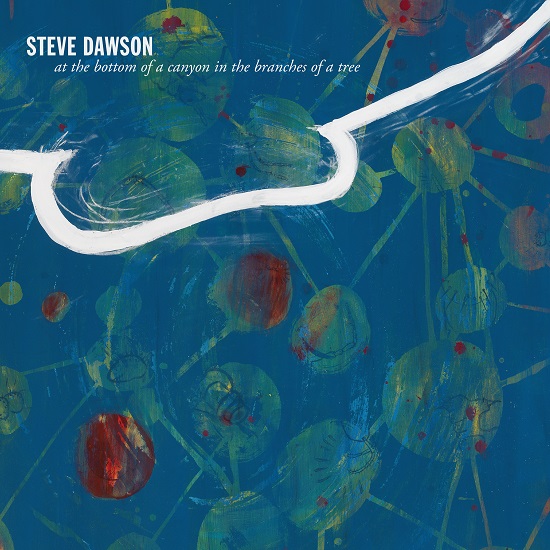
You can’t deny that the last couple of years have been difficult times for musicians, but the creative impulse won’t be stifled. Artists will take the clay that’s available and use it to fashion their creations. The Trump years spawned many memorable albums, then musicians found different ways of working through a pandemic with very little personal interaction to help the process. Steve Dawson’s raw material for “At the Bottom of a Canyon in the Branches of a Tree” came from a different place. Following a family tragedy, he took an extended sabbatical to decide whether he wanted to continue writing and performing. A songwriting retreat with Richard Thompson and Patty Griffin gave him the answer he needed and he found his clay (mainly) in his own personal experiences.
The album’s quite unusual in that it’s almost entirely the work of Steve Dawson; there are no co-writes or covers and only three other musicians make cameo appearances. Apart from Alton Smith’s piano on a couple of songs, Michael Miles’ banjo on “The Spaces In Between” and a Diane Christiansen vocal on “We Are Walking in a Forest”, every hook, lick and vocal is Steve Dawson. Quite apart from the instrumental versatility, showcases Steve’s vocal range from the easy, languid tenor into high falsetto. Steve’s voice evokes the classic American west coast country rock bands, sounding at times like Don Henley or Randy Meisner and there’s the occasional nod in the direction of Jackson Browne as the album pulls off the trick of sounding vaguely familiar while constantly introducing new ideas and sounds.
The settings for the songs are pretty laid-back, with nods towards sixties/seventies soul in “This Is All There Is”, psychedelia in “Beautiful Mathematics”, Crazy Horse in the title track and Jackson Browne on “Hard Time Friend”, which has a breakdown and restart two-thirds of the way through that feels a lot like the last section of JB’s “The Late Show” (one of Springsteen’s favourite recorded moments). The musical settings are incredibly varied, with some interesting keyboard instruments appearing (mellotron and dulcimer for a start), creating the perfect ambience for each of the songs.
The album could easily have been a fairly depressing experience, with songs about COVID deaths and forced positivity (“This Is All There Is”), dysfunctional families (“She Knew”) and the limitations of the forgiving gesture (“Forgiveness is Nothing Like I thought it Would Be”), but Steve leavens the mixture with the resoundingly upbeat “22 Rubber Bands”, a song about his love for his daughter, and “Hard Time Friend”, dedicated to his friend Diane Christiansen, celebrating the friends who are with us through times that are good or bad, happy or sad. There are two bonus CD and download songs which didn’t make the vinyl cut for reasons that have nothing to do with quality; “You’re Trying Too Hard”, which nails fake authenticity, and “However Long it Takes”, a reminder that we can always choose to see the good things in the world rather than the negativity which so often surrounds us.
Twelve tracks, fourteen if you buy the CD or download, and each one with an interesting arrangement and lyrics conveying ideas that are important to Steve Dawson, as they should be to all of us. It’s ironic to think that this bunch of songs were created by someone who had started to doubt his creative abilities.
“At the Bottom of a Canyon in the Branches of a Tree” is released on Pravda Records (PR6419) on Friday July 16th.
Here’s the animated video for “22 Rubber Bands”:
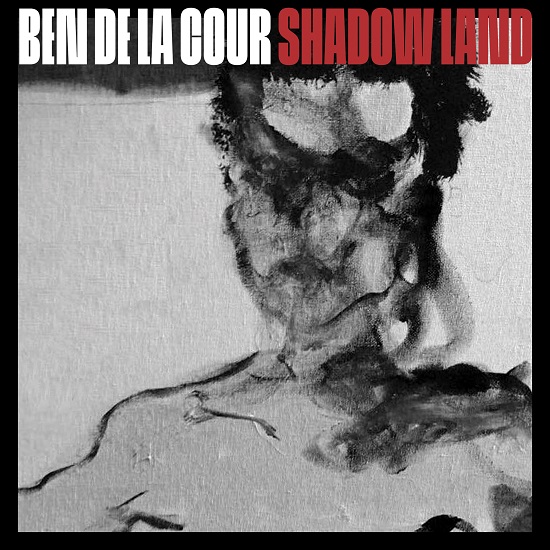
Authenticity’s something that’s often claimed but not always delivered. Not in this case; “Shadow Land” is a powerful and often disturbing collection of songs with a wide variety of themes. And the authenticity isn’t just in the lived experience of Ben de la Cour, although his life suffuses the songs. It’s also in the way the album was made; virtually all of it was recorded live. Brave, perhaps, but vibrant and raw when it’s done well. On “Shadow Land”, it’s done very, very well.
This isn’t a gentle, introspective album of reflective songs tinged with melancholy like Jackson Browne and James Taylor in the seventies. Their hell-raising generally didn’t make it directly into the songs (unless you count “Cocaine” on “Running on Empty”). With Ben de la Cour, it’s a different matter. It doesn’t matter how deep the barrel is, he’ll siphon out the most bitter dregs, then create potent songs from them. If you wanted a more current comparison, Ben has a lot in common with Michael McDermott both in the life lived and in the breadth of musical stylings they use to get the songs across.
“Shadow Land” moves effortlessly from the gentle triple-time pathos of another barely-mourned suicide in “Swan Dive” to the terrifying, hallucinatory “Harmless Indian Medicine Blues” sounding like a half-speed, minor key “Telegram Sam” played by Black Sabbath, with a side order of raw sax. And while we’re on the subject of terrifying, “Basin Lounge” is a full-on, full band romp through the story of a night in one of those bars that sensible people don’t visit, complete with cocaine references. It’s on the edge of falling apart at any time and conveys the stimulant headrush perfectly when the manic guitar solo kicks in.
The album isn’t just about the personal. There’s a smattering of murder ballads in there as well. The album opens with “God’s Only Son”, the tale of double-crossing bank robbers set to an Ennio Morricone-style arrangement, complete with whistling and mandolin while “Amazing Grace (Slight Return)” is a much more mellow take on a hushed-up murder in a small town. There’s also a takedown of corporate greed in the swamp-rock of “In God We Trust … All Others Pay Cash”, but the focus is mainly on the searingly honest depictions life in general and of the Janus faces of dependency and recovery in particular.
Two of the standouts in this vein are “The Last Chance Farm”, a gentle, bleak story of two characters meeting in rehab and the title song with its dystopic alienation and a perfect description of eternal damnation: ‘The Revolutionary Suicide Jazz Band plays all night long’. It certainly sounds a lot like Hell to me.
“Shadow Land” isn’t an easy listen; it’s not meant to be. It’s the product of a difficult life and Ben de la Cour doesn’t shy away from honest depiction of this life. The musical settings are perfect for the subject matter of the songs from the terrible clarity and Jack London references of “Valley of the Moon” to the raw rock and hedonism of “Basin Lounge”. You never know quite what’s coming next; it could be Townes Van Zandt, it could be Nick Cave. Whatever it is, it won’t be dull.
If you like your albums spiced with a murder ballad or two, a touch of the supernatural, terrifying stories of substance abuse, suicide, alienation, Armageddon and cross-dressing, then it’s your lucky day.
“Shadow Land” is released in the UK on Friday April 9th on Flour Sack Cape Records (FSCR-0010).
As a special treat, here’s the video clip for “Harmless Indian Medicine Blues”:
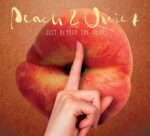 It’s drizzling, freezing and absolutely miserable in the UK at the moment, so that would be the perfect time to listen to an album straight out of 1970s Laurel Canyon via 2020s British Columbia. There are more influences on the album than the Jackson Browne/Eagles/Linda Ronstadt coterie but the album still glows with sunshine of The Golden State, even though its creators Heather Read and Jonny Miller have fairly nebulous Californian connections but, hey, the first two Eagles albums were produced by Glyn Johns at Olympic Studios in London, while Peach & Quiet’s “Just Beyond the Shine” was put together with the help of producer and multi-instrumentalist Steve Dawson in Nashville, Toronto, Vancouver and Victoria. All of the songs are written by Heather, Jonny or both apart from the album’s closer, “Seven Daffodils”, written by Lee Hays and Fran Moseley.
It’s drizzling, freezing and absolutely miserable in the UK at the moment, so that would be the perfect time to listen to an album straight out of 1970s Laurel Canyon via 2020s British Columbia. There are more influences on the album than the Jackson Browne/Eagles/Linda Ronstadt coterie but the album still glows with sunshine of The Golden State, even though its creators Heather Read and Jonny Miller have fairly nebulous Californian connections but, hey, the first two Eagles albums were produced by Glyn Johns at Olympic Studios in London, while Peach & Quiet’s “Just Beyond the Shine” was put together with the help of producer and multi-instrumentalist Steve Dawson in Nashville, Toronto, Vancouver and Victoria. All of the songs are written by Heather, Jonny or both apart from the album’s closer, “Seven Daffodils”, written by Lee Hays and Fran Moseley.
The sun breaks through from the opening notes of the Byrds/Tom Petty-inflected opener, “Empty to Fill” and its poetic exploration of the contradictions and complexity of human beings. From there it’s almost constant Oakley and Ray-Ban stuff, with the exception of the slightly menacing Southern-influenced “Shoreline After A Storm” likening a bad relationship to a storm – they can both inflict terrible damage and leave a messy aftermath. There’s a little hint of “I Put A Spell on You” in there as well.
The songwriting is superb throughout, from the fairly straightforward love song “There’s A Very Good Chance” with its lovely Everlys harmonies to the more complex “Flowers”, which is based on the children’s book “Mr Cat and the Little Girl” which deals with love and loss which has a folky Byrds styling with a relatively complex arrangement that even features a bit of glockenspiel, courtesy of Steve Dawson.
There are themes running though the album; lyrically it’s all about love, whether it’s love for a partner who’s on stage every night (“Lucky in Love”) or for a place (“California Way”). The song arrangements are in the Eagles/Linda Ronstadt mode with layers of electric and acoustic guitars and some absolutely gorgeous harmonies, either as duets or as multi-tracked layers. There’s absolutely nothing out of place on this album.
And, as I finish this review, there’s no rain, and the sun is shining; that was pretty impressive work, guys. This album’s combination of superbly-crafted songs and subtle Laurel Canyon-era arrangements is the perfect antidote to winter on either side of the Atlantic.
“Just Beyond the Shine” is released on January 15th 2012 on Peach & Quiet Music (P&QCD001).
Here’s the video for “Empty to Fill”:
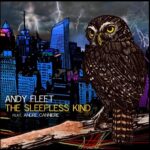 Andy Fleet isn’t the most prolific of album artists; his last album was in 2013. Which doesn’t really matter; his musical world is not ruled by release schedules, so why not release albums when you’re happy you’ve created something that people will want to listen to and appreciate. And I need to apologise here, this album has been out since March but somehow managed to avoid my attention until now and that’s my loss because “The Sleepless Kind” is a little gem of an album, the kind you want to listen to again and again. Even the cover is a nice piece of art by Alban Low inspired by the song ”Through Closed Eyes”.
Andy Fleet isn’t the most prolific of album artists; his last album was in 2013. Which doesn’t really matter; his musical world is not ruled by release schedules, so why not release albums when you’re happy you’ve created something that people will want to listen to and appreciate. And I need to apologise here, this album has been out since March but somehow managed to avoid my attention until now and that’s my loss because “The Sleepless Kind” is a little gem of an album, the kind you want to listen to again and again. Even the cover is a nice piece of art by Alban Low inspired by the song ”Through Closed Eyes”.
The title tells the story; the theme of the album is the night and particularly the musicians who try to scratch a living in those hours of darkness, and those who make the bleary-eyed commuter journey to a day job that enables them to play another night. “The Sleepless Kind” is a tribute to those people who make music because they love making music. Is there a better reason?
“The Sleepless Kind” (which tops and tails the album) is a dreamy instrumental that sounds like it should soundtrack a Raymond Chandler story: gentle piano and moody, muted trumpet of Andre Canniere combine to paint a picture of a jazz club in the early hours, when you stop worrying about the last train and start thinking about the first train.
The remaining seven songs demonstrate the wide variety of influences feeding into Andy Fleet’s unique style. The band is superb with the slower, more evocative songs but goes up through the gears really smoothly for the more uptempo songs , such as “Been There, Drunk That” and the rollicking seventies, horn-driven groove of “Love’s Enemy”, which tells the story of a collector in a style that hints at Al Stewart and maybe even Gerry Rafferty. “Stolen Years”, a John Lennon tribute, hints at Thunderclap Newman, but “The Hobbyist” and “Through Closed Eyes” are the absolute pivot of the album.
“The Hobbyist” is a powerful tribute to Andy’s friend, the late Iain Bull, opening with some Jackson Browne-like piano, while “Through Closed Eyes” opens with a with a fairly traditional jazz set-up of keys, bass, drums (with brushes, initially) and trumpet and spins out its groove for nearly eight gorgeous minutes, telling the story of the London night from the perspective of an owl, silently watching over the neon-lit streets.
Mainly jazz-orientated, “The Sleepless Kind” also hints at blues, rock, pop and soul. The musicianship is superb throughout, never over-played, and the songs are well-constructed and meaningful. The album oozes class and rewards close attention. One to listen to in the small hours with a single malt close at hand.
“The Sleepless Kind” is out now on Low Vinyl Records (LV1608).
And here’s a little video snippet for you:
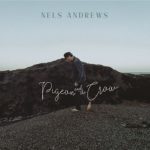 If you want reference points for “Pigeon and the Crow”, I’d go for something between “Sweet Baby James” and “Graceland”. It has the simple, laid-back feel of James Taylor and the experimental rhythms and instrumentation of Paul Simon’s classic. There’s a lot going on, but it never feels cluttered or claustrophobic. There’s something that sets this album apart from the two classics, and it’s the lyrical invention of Nels Andrews’ songs, which are mostly allegorical and metaphorical rather than following straight-line narratives and it makes for a very interesting mixture. It’s a compulsive and beguiling set of songs. And before we move away from the comparisons, you could say that there are hints of Jackson Browne, and Nels’ voice at times sounds a lot like Ian (or Iain) Matthews at the time he was trying to crack the American market in the seventies.
If you want reference points for “Pigeon and the Crow”, I’d go for something between “Sweet Baby James” and “Graceland”. It has the simple, laid-back feel of James Taylor and the experimental rhythms and instrumentation of Paul Simon’s classic. There’s a lot going on, but it never feels cluttered or claustrophobic. There’s something that sets this album apart from the two classics, and it’s the lyrical invention of Nels Andrews’ songs, which are mostly allegorical and metaphorical rather than following straight-line narratives and it makes for a very interesting mixture. It’s a compulsive and beguiling set of songs. And before we move away from the comparisons, you could say that there are hints of Jackson Browne, and Nels’ voice at times sounds a lot like Ian (or Iain) Matthews at the time he was trying to crack the American market in the seventies.
The press pack for the album contains a lyric sheet for the album (it’s in the album packaging as well), but also a very helpful set of writer’s notes for each song, which share the sort of detail you would never pick up on otherwise. “The Lion’s Jaws” is based on the story of an in-law who, at one time, was the only Jewish lion-tamer in history, which is an interesting coincidence, given that Scottish singer-songwriter Dean Owens (recently reviewed here) has also written about a not-too-distant ancestor who was a lion-tamer.
To get some idea of the musical variety of the album, you only need to take a look at the credits. There are thirteen musicians involved and a list of fourteen instruments (not including the many under the umbrella of percussion) from various musical traditions including kora, steel pan, harmonium and flute; it’s not just a lot of instruments, it’s a lot of musical styles melding together seamlessly by producer, flautist and singer Nuala Kennedy.
Highlights? The title song’s hard to beat, with its supernatural love story theme and its lilting Gaelic feel; the opener “Scrimshaw” in triple time and with mid-life memories of happiness and regrets is a perfect evocation of the singer-songwriter genre, and the slightly rockier “Table by the Kitchen” is a fiddle-led, fear-of-missing-out anthem satirising the me generation. What remains in the memory when you reach the end of the album, is the sheer variety of musical settings used to project these songs and support Nels’ mellifluous voice and the way that none of it seems out of place.
“Pigeon and the Crow” is out now.
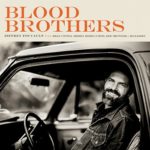 “Blood Brothers” has a very familiar sound; it’s the sound of 1970s Laurel Canyon. That’s not a criticism; the Canyon was a creative hub in the seventies California music scene and it’s no coincidence that Don Henley, a member of that scene covers Jeffrey Foucault’s songs in his live sets. The arrangements and stylings all have the feel of those classic Elektra/Asylum albums of the early 70s. Jeffrey Foucault also has a voice that’s straight out of that era with hints of Randy Meisner and Jackson Browne in there. And, like those albums, the musicianship is of the highest quality while being largely understated. No flash, just perfect settings that allow the ten songs to breathe and shine. And the whole thing was recorded directly to tape over three days in Pachyderm Studios in Minnesota.
“Blood Brothers” has a very familiar sound; it’s the sound of 1970s Laurel Canyon. That’s not a criticism; the Canyon was a creative hub in the seventies California music scene and it’s no coincidence that Don Henley, a member of that scene covers Jeffrey Foucault’s songs in his live sets. The arrangements and stylings all have the feel of those classic Elektra/Asylum albums of the early 70s. Jeffrey Foucault also has a voice that’s straight out of that era with hints of Randy Meisner and Jackson Browne in there. And, like those albums, the musicianship is of the highest quality while being largely understated. No flash, just perfect settings that allow the ten songs to breathe and shine. And the whole thing was recorded directly to tape over three days in Pachyderm Studios in Minnesota.
The opening song “Dishes” sets the tone for the album lyrically and musically. It’s gentle, laid-back and extols the virtues of domestic simplicity, whereas the second song, the apocalyptic, end-of-days “War on the Radio” is less typical. It has a country-rock feel with more of an emphasis on the rock, and is driven along by fiddle fills as we look into the abyss.
The rest of the album has the same DNA as “Dishes”, gentle arrangements pulling out the best in stories of domesticity in small-town America peopled with the characters that we can all relate to: the frustrated singer-songwriter in ”Cheap Suit” and the father looking back at his wedding day (with the album’s second reference to washing dishes) in “Little Warble”, with its clever lyrical device of ‘warble’ appearing at the start of the song in relation to the car’s tape player and at the end in relation to the singer’s heartbeat.
“Little Warble” has a country feel, while the rest of the album is Elektra/Asylum (you’d swear David Lindley was there) apart from the Neil Young-tinged “Blood Brothers” and “Rio” which is pure “Harvest Moon” with picked guitar, drums with brushes and pedal steel. If you’re a fan of the Eagles/Jackson Browne school of music, then you’re probably going to enjoy this album.
“Blood Brothers” is out now on Blueblade Records (BB-006).


